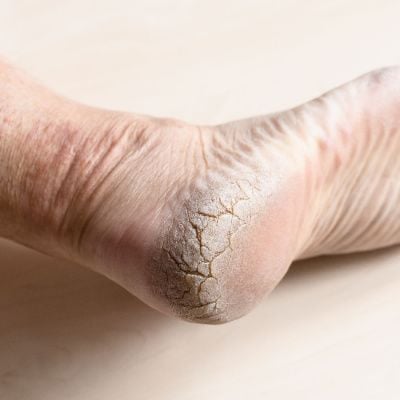 Heel fissures, often dismissed as a cosmetic concern, can evolve into painful conditions if left unaddressed. This article provides a deep dive into the intricacies of heel fissures, exploring their causes, symptoms, preventive measures, and effective treatments to ensure comprehensive foot care.
Heel fissures, often dismissed as a cosmetic concern, can evolve into painful conditions if left unaddressed. This article provides a deep dive into the intricacies of heel fissures, exploring their causes, symptoms, preventive measures, and effective treatments to ensure comprehensive foot care.
How Heel Fissures Develop
Heel fissures, characterized by the formation of cracks or openings in the skin around the heel, typically result from prolonged exposure to dry or harsh conditions. Lack of moisture, friction, and pressure on the heel can contribute to the development of fissures.
Symptoms and Visual Clues
Identifying heel fissures goes beyond mere aesthetics. Symptoms may include visible cracks on the heels, dry or flaky skin, and, in advanced cases, bleeding or pain. Recognizing these signs early on is essential for timely intervention.
Causes and Contributing Factors
- Lack of Moisture: Insufficient hydration and exposure to dry environments can strip the skin of its natural oils, leading to fissures.
- Pressure and Friction: Prolonged standing, ill-fitting shoes, or excessive walking can subject the heel to increased pressure, exacerbating the development of fissures.
- Medical Conditions: Certain skin conditions, like psoriasis or eczema, can heighten the risk of heel fissures.
Prevention Strategies - Nurturing Heel Health
- Hydration: Regularly moisturizing the feet, especially the heels, is a preventive measure. Using emollient-rich creams helps lock in moisture.
- Footwear Choices: Opting for shoes that provide proper support and cushioning reduces heel friction and pressure.
- Regular Exfoliation: Gently exfoliating the heels helps remove dead skin cells, preventing the buildup that can lead to fissures.
At-Home Remedies - Treating Mild Heel Fissures
Several at-home remedies can offer relief for individuals dealing with mild heel fissures.
- Soak and Moisturize: Soaking the feet in warm water, followed by moisturizing, can help soften the skin and alleviate fissures.
- Use of Pumice Stone: Gently using a pumice stone can aid in removing dead skin, promoting healing.
Seeking Professional Care
Persistent or severe heel fissures necessitate professional attention. Podiatrists can assess the condition, address underlying causes, and recommend appropriate treatments.
Professional Interventions
- Prescription Creams: In cases where over-the-counter creams prove ineffective, prescription-strength formulations may be prescribed to accelerate healing.
- Debridement: Podiatrists can perform debridement procedures to remove excessive dead skin, promoting healthier skin regeneration.
Lifestyle Adjustments - Sustaining Heel Wellness
Incorporating small lifestyle changes can contribute to long-term heel health.
- Stay Hydrated: Ensuring overall hydration supports skin health from the inside out.
- Foot Checks: Regularly inspecting the feet for signs of fissures allows for early intervention.
Conclusion
In conclusion, understanding heel fissures involves acknowledging their origins, recognizing symptoms, and adopting preventive measures. Whether through at-home remedies or professional interventions, prioritizing heel health contributes to overall foot wellness. By embracing a comprehensive approach to care, individuals can stride towards a future free from the discomfort of heel fissures, ensuring comfort and confidence with every step.
Disclaimer:
The information on this website is provided for educational and information purposes only and is not medical advice. Always consult with a licensed medical provider and follow their recommendations regardless of what you read on this website. If you think you are having a medical emergency, dial 911 or go to the nearest emergency room. Links to other third-party websites are provided for your convenience only. If you decide to access any of the third-party websites, you do so entirely at your own risk and subject to the terms of use for those websites. Neither Joseph Stuto, DPM, nor any contributor to this website, makes any representation, express or implied, regarding the information provided on this website or any information you may access on a third-party website using a link. Use of this website does not establish a doctor-patient relationship. If you would like to request an appointment with a health care provider, please call our office at 718-624-7537.



